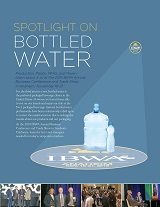Several recent media stories and a statement issued by the National Toxicology Program have raised questions about the safety of polycarbonate plastic bottles due to the presence of a substance known as bisphenol A, or BPA.
Many consumer products use polycarbonate plastic, including many types of food and drink containers.
As for bottled water, you will find many three and five-gallon bottled water containers made from polycarbonate plastic, and you can remain confident about the safety of these products.
Bottled water is comprehensively regulated as a food product by the U.S. Food and Drug Administration. In addition, plastic food and beverage containers – including polycarbonate plastic made with BPA – must meet or exceed all FDA requirements.
Polycarbonate plastic has been the material of choice for food and beverage product containers for nearly 50 years because it is lightweight, highly shatter-resistant, and transparent. Many studies and comprehensive safety evaluations have been conducted by government bodies worldwide to assess the potential for trace levels of BPA to migrate from plastic bottles into foods or beverages.
The conclusions? That polycarbonate bottles are safe for consumer use.
An April 14, 2008 National Toxicology Program Draft Brief on BPA confirms that there are no serious or high level concerns for adverse effects of the chemical on human reproduction and development.
Steven G. Hentges, Ph.D., of the American Chemistry Council’s Polycarbonate/BPA Global Group, states:
“…findings in NTP’s draft report provide reassurance that consumers can continue to use products made from bisphenol A. Importantly, this conclusion has been affirmed by scientific and government bodies worldwide.”
In addition, this brief confirms that human exposure to BPA is extremely low, and noted there is no direct evidence in humans that exposure to BPA adversely affects reproduction or development.
Lastly, the limited evidence for effects in laboratory animals at low doses primarily highlights opportunities for additional research to better understand whether these findings are of any significance to human health.
For more information on this issue, visit the American Chemistry Council’s Web site at www.factsonplastic.com or www.bisphenol-a.org.
Also, you can check out our Q&A on BPA here.



























